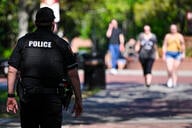You have /5 articles left.
Sign up for a free account or log in.
INDIANAPOLIS -- As the country continues to be roiled by continued revelations of sexual assaults perpetrated (mostly) by powerful men, the National Collegiate Athletic Association will take initial steps toward considering a blanket rule on athletes with a history of such acts.
While individual colleges and an NCAA conference have created policies barring athletes who have been tied to sexual violence, so far the association has resisted adopting a broader decree.
At the NCAA’s annual convention Wednesday, a member of its Commission to Combat Campus Sexual Violence, Cindy Aron, told a crowd that select commission members would meet in Washington next week. They will discuss, she said, a prospective associationwide policy on athletes with a history of sexual assault. Nothing concrete has yet been developed.
This “think tank” will also involve higher education experts from across the country who work on sexual violence initiatives on campuses, Aron said.
Aron is not an NCAA representative but rather a social worker by trade. She said in an interview that the group wants to discuss next week how institutions can open communication between athletics departments and other college departments.
“Universities and athletics departments in particular tend to be siloed off,” Aron said. “So how can we work together to use resources that are already there and then build upon it with one another?”
Asked to confirm the topic of next week's meeting and the possible development of an associationwide policy, NCAA officials did not provide a response in time for publication.
Advocates for survivors of sexual assault applauded Indiana University at Bloomington last year for its new policy that suspends athletes, both first-year students and transfers, who have a history of sexual violence. Critics of the policy said it was discriminatory and disadvantaged the university.
Per the policy, Indiana students who have either been found guilty criminally or pleaded no contest to a felony sex crime, such as rape or domestic violence, are disqualified from participating in intercollegiate athletics-related financial aid, practice or competition.
If an athlete is accused of rape or a similar offense, then a university panel meets to decide whether to suspend the athlete from play -- but the athlete might not necessarily be removed from campus.
“You have to have these conversations,” Mattie White, senior associate athletic director for academic services at Indiana, said during a convention session on athletes’ health. “And they’re hard, right? When you’re recruiting someone, it’s not the first conversation you’ll have -- ‘have you done something really terrible and bad?’ But we want to make sure we are looking at their digital footprint, trying to figure out who these individuals are before we bring them to our campus.”
Colleges aren’t required to track sexual assault convictions or cases at other campuses. The NCAA hasn’t given any direction on this issue, either.
Indiana’s policy was inspired by a narrower Southeastern Conference rule that bans only transfer students with a record of sexual assault. SEC Commissioner Greg Sankey told Inside Higher Ed that a group of athletics directors, college presidents and other administrators discussed expanding the prohibition, but so far the conference is satisfied with the policy approved in 2015. Sankey said at the time that first-year students sometimes have offenses that are “shielded” because they were minors.
On the NCAA leadership's part, the Board of Governors adopted a new policy last year on campus sexual violence saying athletics departments should know about campus policies on sexual assault and when a student is accused or found guilty of sexual violence.
Colleges' sexual assault processes and contact information for an institution’s Title IX coordinator (named for the federal anti-gender-discrimination law Title IX of the Education Amendments of 1972) should be provided to athletes, the policy states. Coaches, athletes and sports administrators should receive prevention training, according to the policy. The NCAA also publicizes a tool kit for mitigating sexual violence.
At Grinnell College, an Iowa institution that competes in the NCAA's Division III, administrators encourage buy-in from students on sexual assault prevention campaigns, Jen Jacobsen, assistant dean of students and director of wellness and prevention, said during the health session.
Jacobsen said the college seeks out students with “social capital” on campus. And when recruits visit campus, some current athletes are encouraged to tell their coaches if they see those visitors doing “creepy things” or being “predatory.”
Often the athletes will observe behavior the coaches don’t, Jacobsen said.
“They know they can tell their coach, ‘This is not someone I want as part of our team,’” she said. “And our coach stops recruiting them. No matter how talented they are athletically. That’s a values piece that’s about student engagement.”
A Grinnell football player, Carson Dunn, told the audience at the convention that he leads sexual violence prevention initiatives among students -- to great success.
Grinnell has developed multiple groups, including Student Athletes Leading Change and Student Athlete Mentors, to fight the current culture, Dunn said. On one particular night, he said, another group of students marched around campus to talk about campus sexual assault and challenge students.
“We want you to step up and change something about your life to help this fight,” he said. “Whether it’s educating yourself on the topic, or … it’s when that person makes that uncomfortable rape joke, you step in and you stop that. It’s small things that really help change.”




